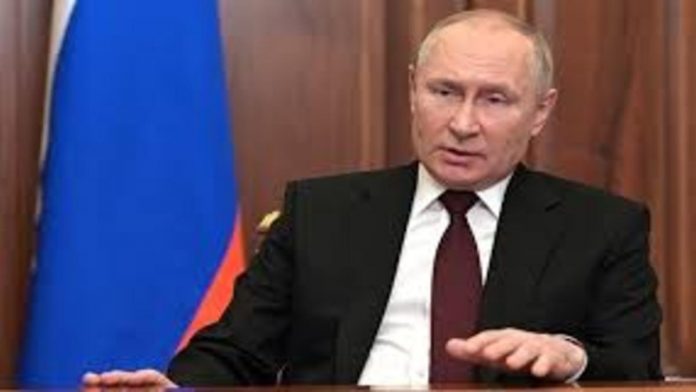On Thursday, Russian President Vladimir Putin announced a military campaign in Ukraine, prompting explosions across the country and warnings from the country’s foreign minister that a “full-scale invasion” was underway.
Weeks of intense diplomacy and Western sanctions against Russia failed to deter Putin, who had amassed between 150,000 and 200,000 troops along Ukraine’s borders.
“I have decided on a military operation,” Putin stated on national television, prompting an immediate denunciation from US Vice President Joe Biden and sending global financial markets into chaos.
According to AFP correspondents, explosions were heard shortly after the announcement in Ukraine’s capital, Kyiv, and numerous other locations.
Putin urged Ukrainian soldiers to lay down their weapons and defended the operation by alleging that the government was committing “genocide” in the country’s east.
The Kremlin had previously stated that rebel commanders in eastern Ukraine have requested military assistance from Moscow in their fight against Kyiv.
The scope of Thursday’s attacks remained unclear, but Ukraine’s Foreign Minister Dmytro Kuleba claimed the worst-case scenario was unfolding.
“Putin has now unleashed an all-out assault on Ukraine. Strikes have broken out in Ukraine’s peaceful cities “Kuleba sent out a tweet.
“This is an aggressive war. Ukraine will defend itself and emerge victorious. Putin can and must be stopped by the rest of the world. Now is the moment to take action.”
Biden immediately warned that there would be “consequences” for Russia, including “catastrophic loss of life and human misery.”
Russia’s “reckless and unprovoked aggression” on Ukraine was criticised by NATO’s head.
Putin’s move came after Ukraine’s President Volodymyr Zelensky made an anguished appeal to Russians not to support a “big war in Europe” late Wednesday night.
In Russian, Zelensky claimed that the Russian people were being misled on Ukraine.
Zelensky said he tried calling Putin but got “no answer, only quiet,” and that Moscow now has roughly 200,000 troops near Ukraine’s borders.
Separatist leaders in Donetsk and Lugansk wrote separate letters to Putin on Wednesday, pleading with him to “assist them in repelling Ukraine’s aggression,” according to Putin’s spokesperson Dmitry Peskov.
The two letters, both dated February 22, were published by Russian official media.
Their appeals followed Putin’s recognition of their independence and the signing of friendship treaties with them, which included defence deals.
Moment of peril
Putin had fought a storm of international criticism over the situation for weeks, with some Western leaders accusing him of losing his cool.
His declaration of the military operation came only days before a last-ditch European Union summit in Brussels scheduled for Thursday.
Another aspect of the wave of Western punishment following Putin’s attempt to rewrite Ukraine’s borders was the imposition of sanctions on Russia’s defence minister, Sergei Shoigu, and high-ranking personnel including the commanders of Russia’s army, navy, and air force.
The UN Security Council gathered late Wednesday for its second emergency session in three days to discuss the crisis, with UN Secretary-General Antonio Guterres’ personal appeal to Putin remaining unanswered.
“President Putin, stop assaulting Ukraine with your troops,” Guterres said. “Too many people have already died.”
Linda Thomas-Greenfield, the US ambassador to the United Nations, warned that a full-scale Russian invasion might displace five million people, causing a new European refugee catastrophe.
Ukraine has asked its nearly three million residents living in Russia to evacuate before Putin’s decision.
“We are united in our belief that the future of European security is being decided right now, right here in our own backyard, in Ukraine,” President Zelensky stated during a joint press conference with visiting Polish and Lithuanian leaders.
Russia had accumulated 150,000 troops in combat formations on Ukraine’s borders with Russia, Belarus, and Russian-occupied Crimea, as well as on warships in the Black Sea, according to Western capitals.
Ukraine has approximately 200,000 military troops and has the ability to mobilise up to 250,000 reservists.
Moscow’s overall troops are substantially larger, with around a million active-duty men, and have recently been modernised and re-armed.
The high price of war
Ukraine, on the other hand, has received modern anti-tank weapons as well as some drones from NATO allies. More has been offered as the allies try to discourage or at least make a Russian attack costly.
Shelling between Ukrainian forces and Russia-backed separatists had increased in recent days, with a Ukrainian soldier killed on Wednesday, the sixth in four days, and residents living near the frontline scared.
Dmitry Maksimenko, a 27-year-old coal miner from government-controlled Krasnogorivka, told AFP that when his wife informed him that Putin had recognised the two Russian-backed separatist enclaves, he was taken aback.
“‘Have you heard the news?’ she inquired. I had no way of knowing. There is no power, let alone internet. I’m not sure what will happen next, but to be honest, I’m scared it won’t be good “he stated
AFP reporters spotted military equipment such as rocket launchers, howitzers, and fuel tanks mounted on trains reaching for hundreds of metres in a Russian settlement some 50 kilometres (30 miles) from the border.
Russia has long demanded that Ukraine be barred from joining NATO and that American soldiers be withdrawn from Eastern Europe.
Putin told media on Tuesday that if the West wanted to de-escalate the issue, it would have to accept a number of strict requirements, including Ukraine abandoning its NATO ambitions and becoming neutral.
On Wednesday, Washington slapped penalties against the Nord Stream 2 gas project, which Germany had effectively halted by delaying certification.
Sanctions have also been announced by Australia, the United Kingdom, Japan, and the European Union.




